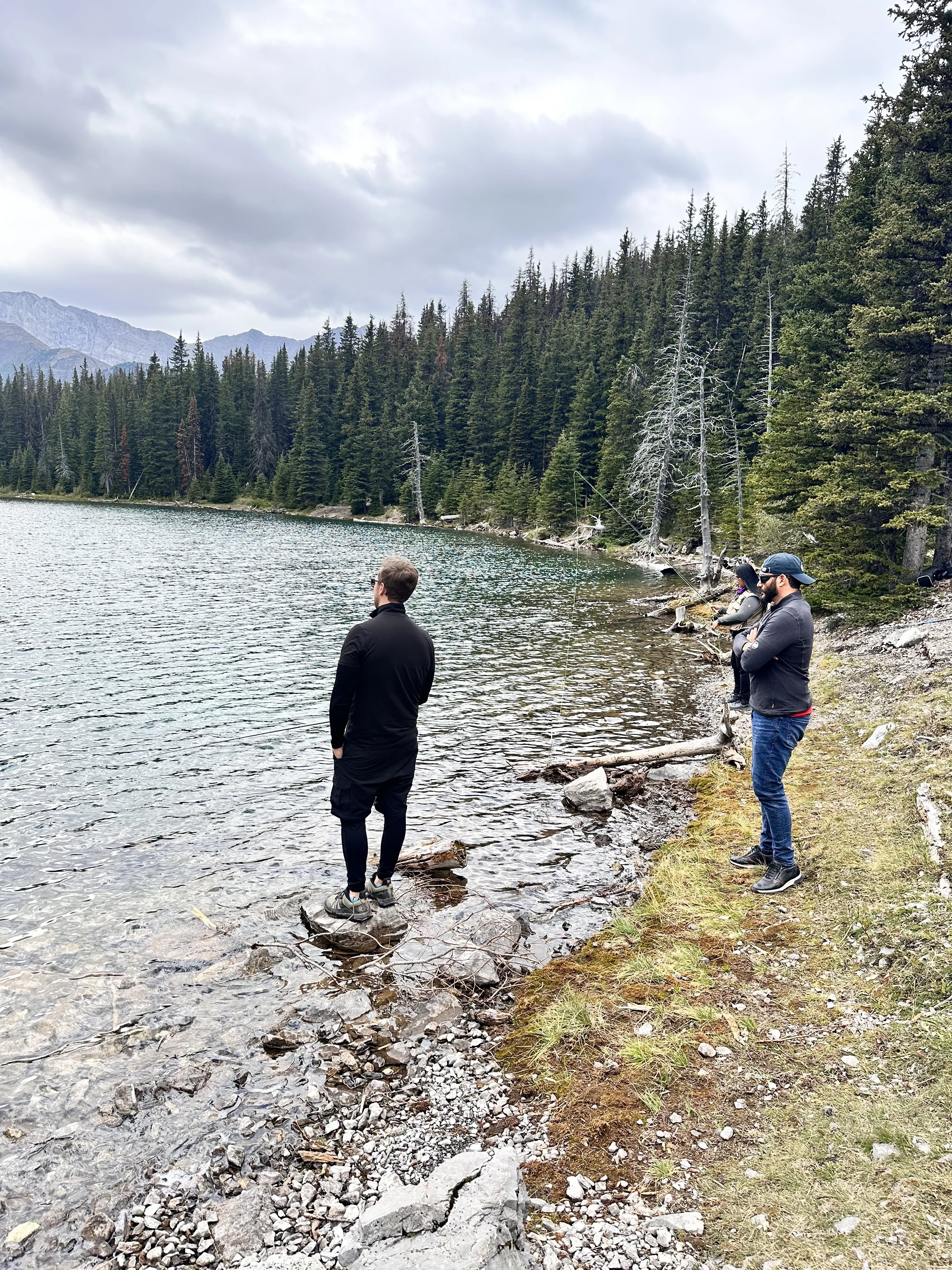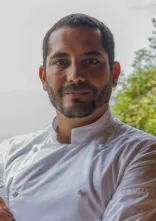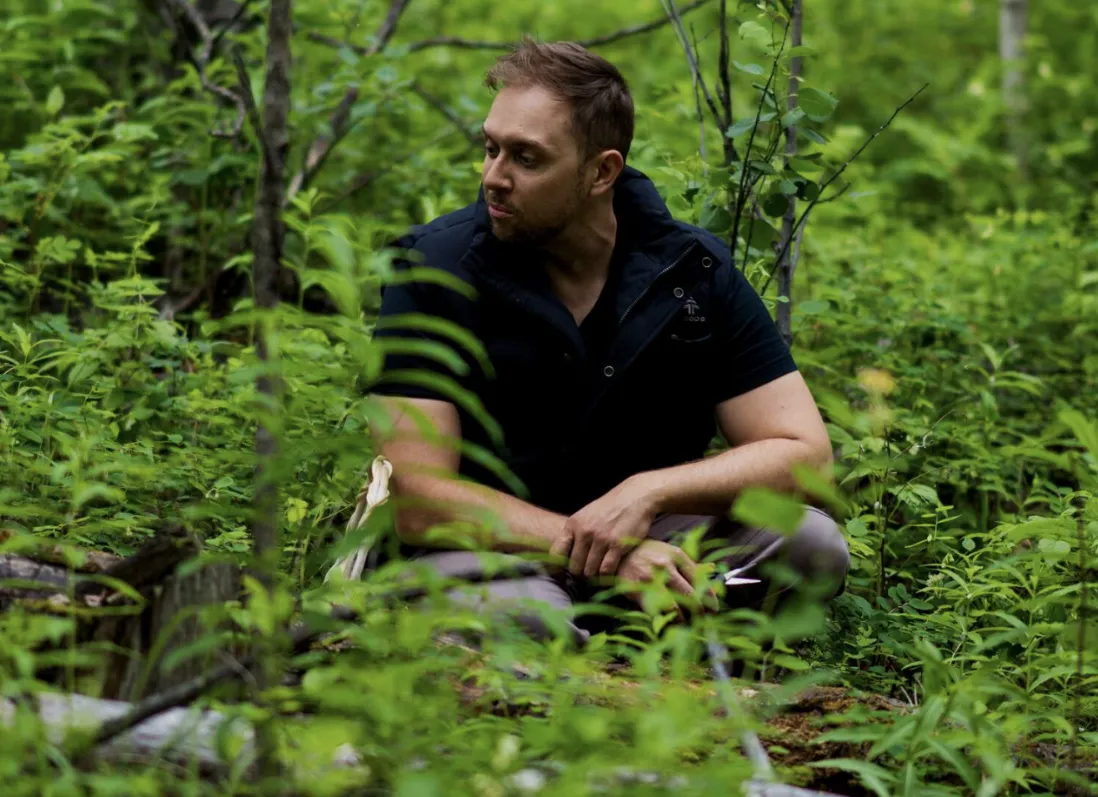Table of contents
The second year of Chef Darren MacLean’s Cultural Chef Exchange is underway in Calgary, AB, where MacLean recently met with visiting chefs Rodrigo Pacheco and Nuit Regular to fly fish, forage, and discuss why restaurants should practice sustainability as they scale their business. Read on to learn more about their conversations, which have been edited for clarity.
Sustainability and creativity go hand in hand when it comes to mitigating food waste (and helping your bottom line)
NR: When I was growing up in a poor family in Thailand, my mother and I would go to our backyard to pick vegetables for us to eat. She taught me to use up every part of the vegetable while cooking, to try to minimize food waste. She showed me that you need to get creative sometimes to make sure nothing goes unused, and that lesson has stayed with me throughout my life and career. Practicing sustainability is just as important to me in all of my restaurants as it was (on a much smaller scale) in my mother’s kitchen.
DM: When it comes to sustainability in my restaurants, we need to think about it in a threefold manner. Firstly, where does our food come from? Secondly, how are we using that food in the restaurant? And thirdly, how do we reduce our impact in terms of waste and our carbon footprint? When you think about it in terms of profitability, every scrap of food that goes into the bin is a waste of dollars, so it just makes sense to consider how to run your kitchen sustainably. Plus, trying to mitigate food waste is not only a practical business strategy, but it also promotes creativity, because you must have artistic vision to make something wonderful out of ingredients that you have on hand.
RP: I think that chefs can be a solution rather than a problem when it comes to climate change. We must avoid throwing away food when so many people are hungry. We must carefully choose the products we utilize, and use as much of the product as possible, and then manage any waste in a conscious way.
At my restaurant Bocavaldivia, we have been working without a menu since we opened over a decade ago. This makes us use whatever is fresh on any given day. Every product is fresh, and we never have to freeze anything. That’s the best way for me. It makes the creative muscles very active, and you’re constantly interpreting the cycle of life of plants and animals, and bringing that creativity into transformational food experiences.

To effectively scale your business, learn to delegate and automate
DM: Something I’ve come to realize over the years, because I’ve certainly tried to take too much on myself before, is that if a business owner can’t get past the struggle of delegating then they are unlikely to be successful in scaling their operation. You have to look inwards and ask yourself: “What is my most important contribution to the business?” I’ve made no secret about the fact that I’m lousy with paperwork. My biggest contribution is cooking and being creative. So I developed good hiring practices, and I hire people I can rely upon to be good at the things that I’m not.
Another important factor when it comes to growing your business is to embrace technology that can help you automate your operations as much as you can. Using Square for Restaurants has been a game changer for me as I’ve scaled my business. I can automate tedious, time-consuming tasks that take me away from my stove (like inventory management) and that also gives me more time to focus on how I want to grow and expand my brand.
NR: I work very closely with the team in my kitchen, so I can spot when someone has potential. I like to sit people down to find out where they see themselves in the future. If they want to grow their role, then we train together. I give them support and allow them to take small steps towards a bigger role. Most of the time, I grow my team from within. It’s very, very rare that I will bring someone in from outside the company. I believe that everyone has the ability to grow, if they want to and if they receive proper guidance.
RP: I am the type of leader that works with my staff. I don’t push behind them, and I’m not in front with them behind me. We fish together, we forage together, we grow food together and we cook together. It’s a very equal, respectful relationship. I also learn a lot from them — my team is a hundred percent from the local community. I am humbled by their wisdom and knowledge. The trust I have in my team’s abilities has been crucial to our success as we’ve grown over the years.
Expanding your business means taking some risks
DM: It takes a lot of courage to expand your business in the restaurant industry, and it requires a certain amount of risk-taking. There are so many variables, and it can be a logistically challenging endeavour, to open up new locations, or to launch a new line of products.
Like I said, I think you have to really have a skill with people in order to expand. You need to find people that can contribute to your vision, as well as helping you to keep the lights on. You have to have a tremendous amount of humility, because you’re going to have to allow people to make decisions on your behalf, and you’re going to have to give them the freedom to do so. You need to be able to take the risk of relinquishing some control, because if you’re going to expand, you won’t be doing it alone. So, there’s some letting go that needs to happen before you can grab onto your next big idea.
NR: Running a business is very, very challenging. As an owner, you spend so much time trying to be perfect, and make everything run perfectly. But you need to be able to take risks if you want to expand your business. The best thing that you can do is be very strategic about your business plan. If you want to open a new location, do your research about the neighbourhood, and figure out what kind of clientele you’d be serving. Crunch the numbers, be thoughtful about staffing and training. There’s so much risk-taking involved in growing your business — the more prepared you are for challenges, the easier it will be to face them head on. Sometimes, growing too fast, you can miss things. But that’s a risk worth taking, and you can always learn from mistakes and make it perfect the next time.
Advice for chefs who want to expand their business sustainably
DM: My biggest piece of advice about expanding your business is: don’t let your vision be compromised. Create a vision or a mission statement or a set of values that outlines why sustainability is important to you. You need to be able to give your team incredible direction, the direction to move along a path and make decisions around the path that you want them to go in. I think the most successful people that I’ve seen that can expand to 10, 12, 15 operations do so because they have a very clear direction and vision for their business, and so it makes it easy for potential employees or managers to follow in that direction without deviating too much.
RP: I would advise present and future chefs to connect with nature. To go out of their kitchens a little bit, and to try to imagine a better world so they can start thinking about solutions to problems. If we connect with nature, we start loving it, and then we start respecting it.
NR: Be confident in yourself and your plans. When you make efforts around sustainability, some might seem small, but they’ll add up, and it will affect the health of your business as a whole.
About the Chefs

Chef Rodrigo Pacheco
Rodrigo Pacheco, Goodwill Ambassador of UN FAO is an Ecuadorian chef, who attracted the world’s attention through his culinary art and his innovative project “The largest Biodiverse Edible Forest in the world”. His vision, his career, and his outstanding participation in the gastronomic competition “The Final Table” produced by Netflix, have been well recognized by the press and international organizations. Currently, he is Executive Chef of the Bocavaldivia restaurant in Puerto Cayo and the recently opened Foresta restaurant located in Quito.

Chef Nuit Regular
Chef Nuit Regular is the Executive Chef and Co-Owner of PAI, Kiin, By Chef Nuit, and Sukhothai, as well as the Executive Chef of Selva. Chef Nuit has transformed the Thai food scene in Toronto through the distinct flavours of Northern Thai cuisine and hospitality. The first Thai SELECT Ambassador for Canada, Chef Nuit has been recognized by the government of Thailand for the authenticity of her Thai cooking and was awarded the prestigious Thai SELECT Signature designation for her restaurants. She has been named a WX Network’s 2022 Top 100 Powerful Women in Canada with the BMO Entrepreneurs Award, and is the recipient of the 2022 American Express Award for Business Leadership. She has been a guest judge on MasterChef Canada and Top Chef Canada, Season 9, appeared on Big Food Bucket List, and is a resident judge on Food Network Canada’s Wall of Chefs. Her debut cookbook, Kiin: Recipes and Stories from Northern Thailand, won a 2021 IACP Cookbook Award and a Taste Canada Gold Award.

Chef Darren MacLean
One of Canada’s most acclaimed chefs, restaurateurs, and environmental advocates, Chef Darren MacLean was Canada’s sole contender and a finalist on Netflix’s global cooking competition ‘The Final Table.’ MacLean is passionate about sustainability and the food building community. While he regularly participates in events as an educator, speaker and culinary judge in Canada and abroad, he is happiest in his kitchens.
![]()







